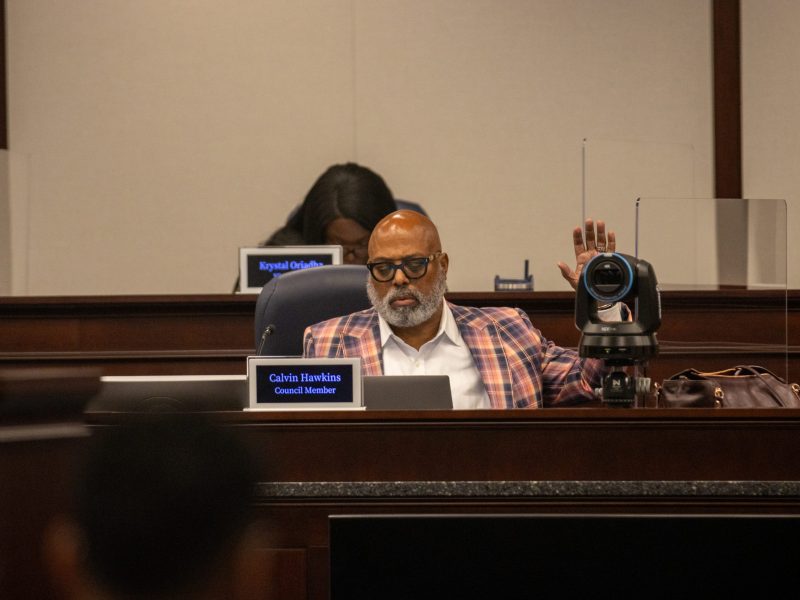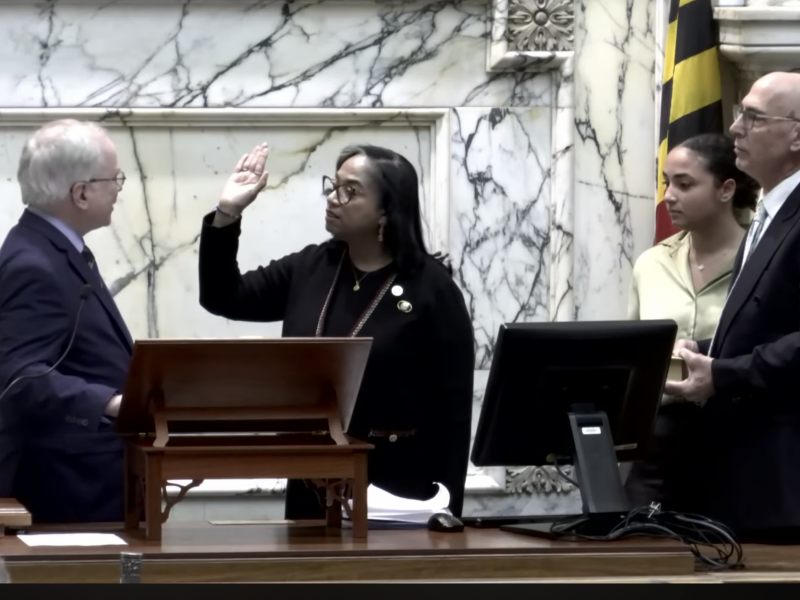By Talia Macchi, Oliver Mack and Irit Skulnik
Voters flocked to the College Park Community Center across the past week to cast their ballots early for the 2024 election.
Early voting in Maryland took place between Oct. 24 and Oct. 31, as voters weighed in on key races in the Nov. 5 election. Vice President Kamala Harris faces former President Donald Trump in the presidential race, and Marylanders will also vote to fill the state’s vacant U.S. Senate seat.
For Adelphi resident Steven Bayard, this year’s election is about “saving democracy.” Bayard, who voted early, said he cast his ballot for Harris in the presidential race.
“It’s scary because I think it’s such an important election in our lifetime,” Bayard said.
Bayard said his opposition to Trump was a significant factor in supporting Harris, citing concerns over Trump’s foreign policy platform.
Like Bayard, Greenbelt resident Susy Murphy also voted for Harris — the Democratic nominee. Murphy was wary of how a second term under Trump would impact democracy, she explained
“I’ve already experienced [Trump] being president and my memory works pretty well,” Murphy said.
[How an Angela Alsobrooks win would affect Prince George’s County government]
Chris Hayes, a freshman finance major at the University of Maryland, voted for Trump, despite not supporting him in the Republican primary.
Hayes, who voted for the first time in this election, voted for Trump because he trusts the former president’s economic and immigration policies, he noted.
“Overall, his four years were better, in my view, than the last administration’s,” Hayes said.
Hayes was one of many students at this university who decided to vote early.
Jonah Roseman, a sophomore geographical sciences major, said early voting is important because not everyone has time to vote on Nov. 5, since Election Day is not a federal holiday. Early voting is “the best for democracy,” he added, as it gives people multiple opportunities to vote.
Senior psychology major Stephanie Aybar Bueno voted early at the College Park Community Center to avoid the “pressure of last-minute voting,” she said. Early voting is not as busy as Election Day, she added.
In the state’s U.S. Senate race, former Gov. Larry Hogan (R-Md.) and Prince George’s County Executive Angela Alsobrooks (D-Md.) are vying to replace retiring Sen. Ben Cardin (D-Md.). The outcome of the race could decide party control in the U.S. Senate.
[How to vote on Election Day in Prince George’s County]
Aybar Bueno, a former fellow on the Alsobrooks campaign, said she is looking for a Senate candidate who cares about increasing employment opportunities and reducing poverty.
Aybar Bueno emphasized that it would be “awesome” to see a senator from a minority background. If elected, Alsobrooks would be the fourth-ever Black woman to serve as a U.S. senator, and the first to represent Maryland.
Bayard said while he prefers Hogan’s policies, he voted for Alsobrooks because of the makeup of the Senate.
“I don’t want the Senate to be Republican because Maryland didn’t elect a Democrat,” he said.
But Hayes said he voted for Hogan, citing his tenure as the state’s governor. Hogan often worked in a bipartisan manner in the overwhelmingly Democratic state, Hayes added.
In addition, Marylanders will vote on a referendum that would enshrine reproductive rights, including access to abortion and contraception, in the state’s constitution.
If passed, the Right to Reproductive Freedom Amendment, listed as Question 1 on the ballot, would secure Marylanders’ rights to prevent, continue or terminate a pregnancy, except if “justified by a compelling State interest achieved by the least restrictive means.”
Sophomore nutrition and food science and psychology major Vianne Hughes said the ballot question is especially important to her. Hughes said she is fortunate to live in a state where abortion is legal, but finds it unsettling that some states do not provide access to reproductive healthcare.
“If something were to happen, or if I needed medical care, some states wouldn’t be able to legally provide that to me and it’s just something that I’m not comfortable with,” Hughes said.
Murphy agreed with Hughes and said each person has a “fundamental right” to make their own healthcare decisions.
“I have never been asked what my opinion is on a man seeking health care of any kind, so I don’t really believe that we should be legislating women, she said”
For Tinique Hymes, a freshman biology major at George Washington University, this election holds significance because it is her first time voting.
Hymes, a College Park native, said she is excited to have the “privilege” to vote and encouraged others to participate in the process.
“Instead of just having an opinion, you get to go out and actually do something,” Hymes said.



